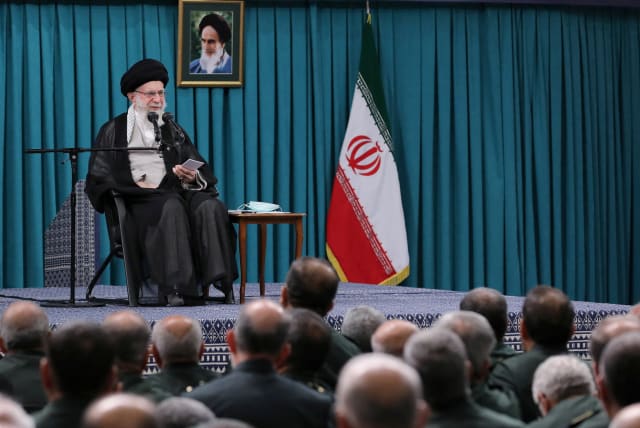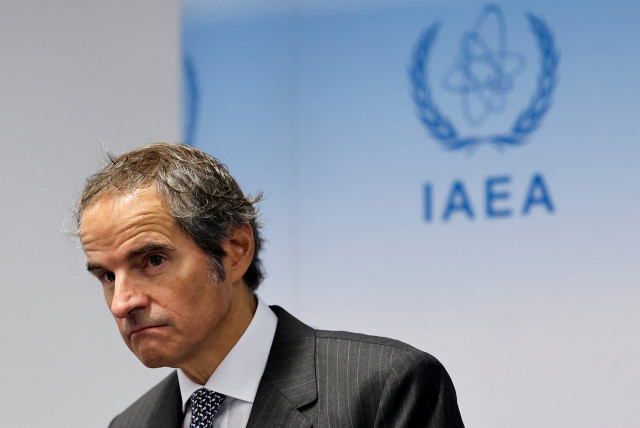Is the IAEA losing patience with Iran? Nuclear chief laments lack of cooperation

"The Iranians are accumulating [uranium]. They say it's for civilian purposes, but we haven't seen much of that in use. It is, in fact, being stored."
In a stark revelation at the World Economic Forum in Davos, International Atomic Energy Agency (IAEA) Director General Raphael Grossi voiced serious concerns regarding Iran's lack of cooperation with his agency. Grossi stated on Thursday that the agency felt it was being held "hostage" amidst Iran's ongoing disputes with Western nations.
"Iran hardly cooperates with the International Atomic Energy Agency. The situation is very frustrating; they limit cooperation in a very unprecedented way," expressed Grossi, highlighting the challenges faced by the international inspectorate in overseeing Iran's nuclear activities. He emphasized the need for visibility commensurate with Iran's ambitious nuclear goals.
Grossi pointed out that Iran, as the only non-nuclear-weapon state enriching uranium at extremely high levels close to weapons-grade, has been found wanting in its cooperation with the IAEA. The agency has been grappling with overseeing Iran's nuclear program, which has continued to expand despite Tehran's repeated denial of any intent to produce nuclear weapons.
Iran has enough material for 'several nuclear warheads'
In an interview with Bloomberg, Grossi delved deeper into Iran's nuclear capabilities, revealing alarming details. "They have enough nuclear material for several nuclear warheads. This doesn't mean that they have them, but they have accumulated so much uranium that this is a possibility. It's a reality. We have seen that they are speeding up the enrichment base, and it's something they can do, but we need to verify it," stated Grossi.
He further highlighted the accumulation of uranium by Iran, ostensibly for civilian purposes, but with limited evidence of its actual usage. Grossi emphasized the need to carefully assess activities that may have future implications, pointing to Iran's enrichment activities, civilian nuclear program, production of centrifuges, uranium mining, and other nuclear fuel cycle activities.
"The Iranians are accumulating [uranium]. They say it is for civilian purposes, but we haven't seen much of that in use. It is, in fact, being stored. We have to divide carefully activities that may have future implications," noted Grossi, expressing frustration at Iran's lack of transparency and clarification on important issues."The problem we have seen is that they have not clarified many important issues. We have discovered things in the past that were not entirely clear to us. Why were we finding traces of uranium in places that were never declared as hosting nuclear activity?" Grossi told Bloomberg.
"We are asking why material was there, if there was equipment there? It is a very frustrating cycle of us asking the questions and not receiving the answers or clarifications."
Despite having an initial understanding during his visit to Iran, Grossi revealed that the commitments made were never realized over the course of the year. "They don't provide the necessary transparency. I was in Iran, and we had some understandings, but over the course of the year, these commitments were never realized, and here we are," expressed Grossi.
The concerns raised by Grossi come in the wake of a December report that Iran has reversed a months-long slowdown in uranium enrichment, reaching levels of up to 60%, close to weapons-grade. The IAEA stated that Iran has increased its production of highly enriched uranium, raising apprehensions globally.The United States expressed deep concern over Iran's actions, particularly at a time when Iran-backed proxies engage in destabilizing activities in the region. The White House highlighted the recent escalation of conflicts in the Middle East."Iran’s nuclear escalation is all the more concerning at a time when Iran-backed proxies continue their dangerous and destabilizing activities in the region, including the recent deadly drone attack and other attempted attacks in Iraq and Syria and the Houthi attacks against commercial shipping vessels in the Red Sea," a White House spokesperson said in December.
Jerusalem Post Store
`; document.getElementById("linkPremium").innerHTML = cont; var divWithLink = document.getElementById("premium-link"); if (divWithLink !== null && divWithLink !== 'undefined') { divWithLink.style.border = "solid 1px #cb0f3e"; divWithLink.style.textAlign = "center"; divWithLink.style.marginBottom = "15px"; divWithLink.style.marginTop = "15px"; divWithLink.style.width = "100%"; divWithLink.style.backgroundColor = "#122952"; divWithLink.style.color = "#ffffff"; divWithLink.style.lineHeight = "1.5"; } } (function (v, i) { });

